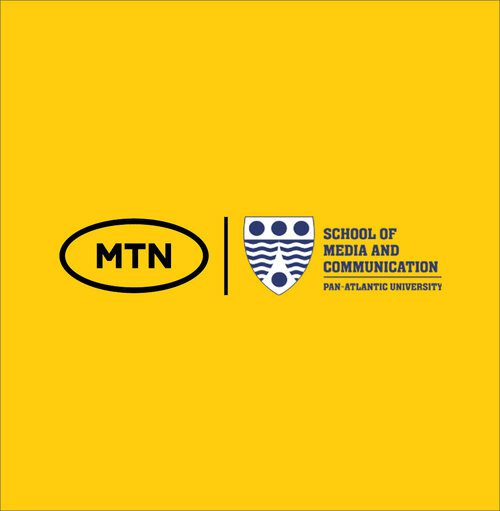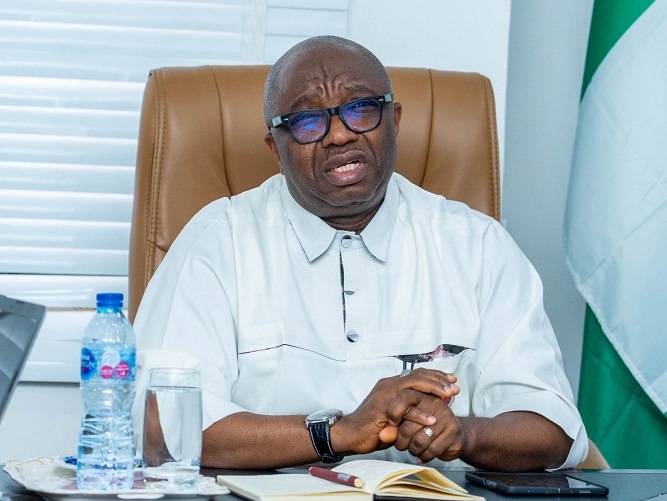Telecom
Cybersecurity: “NCC is Committed to Responsive Regulations for Sustainable Growth of Digital Economy” – Danbatta

Prof. Umar Garba Danbatta, Executive Vice Chairman (EVC) of the Nigerian Communications Commission (NCC), has stated that the Commission is irrevocably committed to boosting the nation’s digital economy through responsive regulations.

Danbatta gave this assurance at the Commission’s 2021 Annual Cybersecurity conference, organised in collaboration with the Office of the National Security Adviser (ONSA) which took place at the Transcorp Hilton Hotel, Abuja recently.
The theme of the event was “Building Trust in the Digital Economy through Cybersecurity and Sensitization on the Implementation of the National Cybersecurity policy and Strategy (NCPS).”
Represented by NCC’s Executive Commissioner, Stakeholder Management (ECSM), Adewolu Adeleke, the EVC said the Commission will continue to be at the forefront of ensuring sound cybersecurity culture built on people, process and technology to bolster digital economy in Nigeria.
Emphasising the centrality of information sharing with stakeholders, Danbatta urged telecom consumers and the public to take advantage of NCC’s pervasive communications campaign planned to create awareness and sensitize the public about the wiles of cyber criminals.
“Our various cybersecurity awareness initiatives and campaigns are helping the public to understand the risks in digital space and how to reduce the vulnerabilities that adversaries can benefit from.
“Our collective resolve is to continuously boost trust and confidence in our digital economy by ensuring adherence to sound cybersecurity culture and hygiene, internally and with external partners as well as stakeholders,” the EVC said.
He explicated on the increasing dynamics in the digital space by informing the audience that the Commission recognizes the importance of ensuring and instituting appropriate cybersecurity measures to derive meaningful gains from the emergent digital economy.
Danbatta asserted: “The growth of digital economies is changing how “trust” is valued by institutions, businesses, and the public. The increase in technological advancement has also resulted in increase in cybercrimes, as well as identity theft and fake news campaigns that have introduced fresh dimensions that affect the notion of trust in the digital era”.
Giving a sharper voice and focus to trust and confidentiality while online, the NCC Chief Executive stated that trust and confidentiality promote a healthy digital environment, as gleaned from global best practices in order to guarantee the privacy and integrity of digital data.
He said to improve digital trust and confidentiality, the digital economy should be built on trusted technologies and partnerships, ensuring strong cybersecurity that rides on public’s confidence, security, privacy and safety to bolster responsive regulations, transparency, accountability and digital governance.
“Acceleration of innovations and enterprise in the digital space amplify vulnerability opportunities, which malicious parties are quick to exploit, thereby slowing down the gains of digital economy. Notwithstanding, strong cybersecurity will have the advantage of reducing the surface of vulnerabilities in the digital economy that can be exploited. Thus, sound cybersecurity is a stimulus for secure and prosperous digital economy,” he said.
Speaking further, Danbatta affirmed that the launching of NCC Computer Security Incident Response Team (NCC CSIRT), which is the telecoms sector’s version of the Nigerian Computer Emergency Response Team (ng. CERT) is a testament of the Commission’s resolve to promote a healthy digital environment in the telecom sector.
Danbatta called on cybersecurity stakeholders to key into the National Cybersecurity Policy and Strategy (NCPS) 2021, and accelerate the adoption of its various components as cybersecurity is a collective responsibility and no single government, business or individual is immune or can do it alone.
The National Security Adviser (NSA), Major-General Babagana Monguno (Rtd), who was represented by the Director, Communications at ONSA, Brigadier General Samad Akesode, recognises the commitment of the Commission in creating awareness on the implementation of national cybersecurity policy and promised even greater collaboration of ONSA with the NCC on the nation’s cybersecurity drive.
The event was attended by people from the academia, including the Vice Chancellor of Nasarawa State University, Chairman and other members of NCC Board of Commissioners, representatives of Chairman EFCC, and representatives of Directors General of National Identity Management Commission (NIMC) and the National Information Technology Development Agency (NITDA). Other attendees and participants include Directors and top management staff from many Ministries, Departments and Agencies (MDAs) of government, key players in the telecom ecosystem (including ALTON and ATCON), telecom companies, ICT firms, cyber security experts as well as representatives of institutions and agencies in the security governance sector, development enthusiasts, journalists and other communication professionals.
Telecom
How MIP Is Making a Difference in The Media Landscape

MTN Media Innovation Program (MIP), a six-month fully-funded certificate fellowship designed for media professionals, is redefining journalism and content creation in Nigeria.

Now in its fourth year, MIP, launched by MTN Nigeria in partnership with the School of Media and Communication (SMC), Pan-Atlantic University, is empowering journalists, broadcasters, and content creators with the tools to adapt, innovate, and thrive in today’s challenging media landscape.
Despite promising forecast that the market value of the Nigerian entertainment and media industry will grow from US$9.0bn in 2023 to US$13.6bn in 2028, the media sector has since grappled with issues such as limited access to training, financial instability, and the rapid decline of traditional revenue models. With digital platforms disrupting how news is consumed and monetised, journalists and media owners must rethink their approach.
MIP provides a structured learning environment where media professionals gain first-hand exposure to new industry trends, digital transformation, and the intersection of media and ICT. From data journalism to audience engagement strategies, participants leave the program with actionable skills that are shaping the future of storytelling in Nigeria.
A standout feature of MIP is its international study visit to South Africa, where fellows engage with leading media institutions, visit MTN Group’s headquarters, and participate in hands-on training sessions at the University of Johannesburg. This global exposure provides invaluable insights into how media practitioners in other markets are leveraging technology and innovation to stay ahead.
For many participants, this has been a career-defining experience. Juliet Tontoye, Vice-President, MIP Cohort 3, describes the program as ‘a turning point.’ “When we share our experiences with our colleagues at our respective media houses, we realize that the program’s benefits and impact are easier to experience than explain. In the past three months, MIP has been such an eye-opening journey. It’s a fellowship every media professional needs to experience. MTN has been such a wonderful host and we know this costs millions of Naira. However, we believe it will have a profound impact on our colleagues.”
Beyond individual impact, MIP is helping reshape the media industry by fostering collaboration and leadership. By bridging the gap between traditional journalism and digital innovation, the program ensures that fellows graduate not just as better storytellers, but as industry disruptors with a mission to create lasting change. The program’s 60 alumni, now spread across Nigeria’s top media organisations, are applying their knowledge to revolutionise newsrooms, create digital-first content strategies, and introduce sustainable business models.
According to Tobechukwu Okigbo, Chief Corporate Services & Sustainability Officer, MTN Nigeria: “When we launched MIP in 2022, our goal was to enhance media professionals’ reporting capabilities and deepen their understanding of the technology sector, empowering them to become true media innovators. Seeing the impact of the programme over the past three years has been both inspiring and humbling. We are proud to continue this initiative and invite all eligible media professionals and content creators to seize this opportunity by applying for the fourth cohort.”
Similarly, the Dean of the School of Media and Communication, Pan-Atlantic University, stated: “SMC will leverage its extensive experience in training media professionals to equip this next cohort. And we will do this with our usual emphasis on creativity and ethics.”
With over 60 fellows trained since its inception in 2022, MIP is building a network of media advocates who are championing ethical reporting, storytelling innovation, and the smart use of technology in journalism.
MTN Nigeria has invested over NGN 300 Million in building Nigeria’s media industry in the past three years through its partnership with PAU.
As applications open for the 2025 cohort, the program continues to attract top-tier talent eager to take their careers to the next level and contribute to the transformation of Nigerian media.
For journalists, broadcasters, and content creators looking to future-proof their careers, the MTN Media Innovation Program is more than just a fellowship—it is a movement that is reshaping the industry, one fellow at a time.
Interested journalists, bloggers, and content creators can apply for the MIP 2025 at https://bit.ly/MTN_MIP2025.
Telecom
Nigeria Heads Anglophone Data Protection Committee

Dr. Vincent Olatunji, Chief Executive Officer of the Nigeria Data Protection Commission, has been appointed as the Chair of the Anglophone Countries Committee of the Network of Africa Data Protection Authorities (NADPA).

The appointment, confirmed on April 2, underscores Nigeria’s leadership in Africa’s data privacy efforts. Speaking after his confirmation, Olatunji urged members to prioritize collective efforts in protecting the privacy rights of over 1.4 billion Africans.
Meanwhile, Nigeria will host the 2025 NADPA Annual General Meeting and Conference in May. Themed “Balancing Innovation in Africa: Data Protection and Privacy in Emerging Technologies,” the event will showcase Nigeria’s strides in digital economy development under President Bola Ahmed Tinubu’s administration.
Telecom
NCC Asks Consumers to Monitor Data Usage to Authenticate Consumption

Nigerian Communications Commission (NCC) has charged the over 174 million telecoms subscribers in the country to constantly monitor their data usage to authenticate their consumption level.

This follows concerns being raised by telecoms consumers about the rapidity of data depletion on their devices.
The Commission particularly enjoined the consumers to always contact their service providers to make requests for cases of discrepancies noted in their data usage.
While the consumers are expected to contact their service providers to request for their usage history/statement where inconsistency exists in their data usage as first step, the Commission said they may also escalate such issues to the Commission through its toll-free Number 622 and social media platforms, especially if their requests are not satisfactorily handled.
The Commission, which also made some clarifications regarding the concerns being raised by the consumers around data usage, said the need to inform the consumers on their concerns is part of its commitment to protect and appropriately inform and educate the telecom consumer on industry issues.
Making further clarifications around data speed and usage, the Commission said data speed is the speed at which data is transferred between two devices, measured in megabits per second (Mbps or mbps), stressing that given the spread of Internet services and the immense investment in the sector, data rates have continued to increase and users may be unaware of how to measure data speed.
The telecoms regulator explained further that websites such as www.fast.com also provide an easy way for consumers to measure Internet speed on any device at any location.
“The higher the data speed, the quicker pages load-downloads and uploads-occur and expectedly, the quicker data bundles are exhausted. So, as telecom consumers are able to do more on devices in less time, some consumers’ devices & network service providers make it possible to limit data speed to help users manage data usage better.
“In any case, most devices now include functions to measure data used by devices and it is imperative that users monitor same to authenticate data usage, such as applications left running on devices. Therefore, where discrepancies occur users may contact their service provider to request for their usage history/statement. If request is not dealt with satisfactorily then, users can contact NCC by calling 622 or engage the Commission via its social media platforms”.
It added that the data usage experience is a function of location, network equipment and users connected in a particular location.

 Broadcasting2 days ago
Broadcasting2 days agoDStv Revenue Plunges as MultiChoice Loses Nearly 4m Subscribers

 News1 day ago
News1 day agoNIPSS Projects Petrol Prices to Hit ₦750/Litre Before Year’s End!

 Telecom2 days ago
Telecom2 days agoNCC Asks Consumers to Monitor Data Usage to Authenticate Consumption

 Telecom2 days ago
Telecom2 days agoPhone Theft: AMCODET Urges Mandatory Registration @ Point of Purchase

 News2 days ago
News2 days agoQuestions Over House of Reps Threat to Arrest NIMC DG

 News2 days ago
News2 days agoTikTok Sale Deal Expected Before April 5 Deadline – Trump

 E-Financial2 days ago
E-Financial2 days agoFidelity Bank Records a 210.0% Growth in PBT to N385.2bn

 Telecom2 days ago
Telecom2 days agoCassava and Microsoft Boost Youth Employment in Green Tech






















